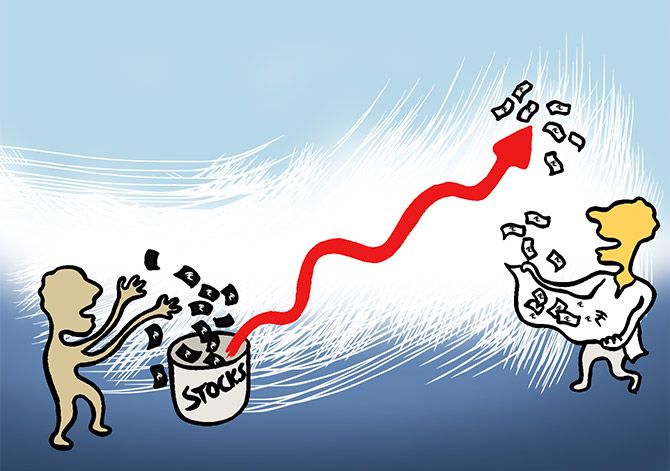'If I had to highlight one area that will do well, it is the financial assets -- that is the private sector banks, insurance and mutual funds.'
Illustration: Dominic Xavier/Rediff.com

Christopher Wood, managing director and equity strategist at CLSA, tells Puneet Wadhwa that the UP poll results has made a mockery of the criticism that demonetisation received and the outcome confirms that Prime Minister Narendra Modi should have a second term in government
What are the implications of the assembly poll outcome for the markets and the government's reform agenda?
'Demonetisation is one of the most remarkable high stakes strategy that I have ever seen globally.'
The outcome of the elections, especially in Uttar Pradesh, is a big positive. It confirms that the prime minister should have a second term in government.
It also highlights that the incredibly ambitious strategy of demonetisation has paid off from a political standpoint.
It is a dramatic result in the context of what pundits were terming only 50:50 chance of the Modi government winning the elections.
The key consequence of demonetisation will be to promote the use of financial assets in the Indian economy.
The existence of the combination of electronic identification cards (Aadhar cards) and the technology available means that digital banking transactions will be accelerated.
I view all this as a positive for the domestic demand story in India, and for the use of more financial assets.
The UP election result has made a mockery of the criticism that the demonetisation got.
If a lot of people had not supported the demonetisation programme, such an election outcome would not have been possible.
The most startling thing about all this is the political dynamic.
Doing demonetisation at such a short period and ahead of the country's most important state election is a highly risky strategy, which not many politicians across the globe would have done.
It (demonetisation) is one of the most remarkable high stakes strategy that I have ever seen globally.
For me, that's the biggest point of all.
How are global investors likely to see India as an investment destination post the assembly poll outcome?
I think more flows will come in.
At the start of the year, foreigners were sceptical about India. They were basically looking for reasons to stay away.
But in the last three weeks, that sentiment has changed, as the Indian markets have been doing well.
So at the beginning of the year, when I was telling people to remain heavily overweight India, I got a lot of push back. But, now I don't.
Which sectors do you see taking the lead if the markets were to move higher from here on?
The key story remains the domestic demand stocks.
I am still not expecting a capex cycle in India in the next fiscal year.
I am bullish on the domestic demand story.
'My contrarian play is the Indian real estate sector, which is currently out of favour.'
If I had to highlight one area that will do well, it is the financial assets -- that is the private sector banks, insurance and mutual funds.
These sectors are the real beneficiaries of the government's demonetisation drive.
These are the areas where I am overweight in my portfolio, and haven't changed the stance.
How do valuations look at this stage?
The valuations are quite high. In my view the valuations will continue to remain high for most of the well regarded companies.
Are the markets fully factoring in the negatives, if any, as regards GST (goods and services tax) bill implementation and the delay in pick-up in corporate earnings due to demonetisation?
The key issue is how much the use of financial assets is being promoted, and how much more can the Aadhaar card be put to use.
We are already seeing the concrete benefits of Aadhaar card usage show up, as people are receiving higher subsidy payments net of leakages by using these cards.
The reality of Aadhaar and electronic banking should be that the leakages reduce.
The government has been proactive as regards trying to resolve issues related to the PSU banks.
Would you now look to add more large-cap PSU banks in your portfolio?
The one straight forward positive story in India is the private sector banks.
There are still issues with the public sector banks, like inadequate recapitalisation.
This means that the private sector banks will continue to grab market share from the PSUs.
The arrival of the Aadhaar card and smartphones means that digital banking has become more feasible.
This means that the private sector banks can expand their market share more quickly than previously where they depended on expanding branches.
Thus, private sector banks remains the most straightforward story in India.
What are your contrarian plays/bets in the Indian context?
My contrarian play is the Indian real estate sector, which is currently out of favour.
I expect dramatic consolidation in this sector after the Real Estate Regulation Act, REERA, is implemented.
This will bring a lot of reform in the Indian property market, which traditionally has been an area of black money.
Going forward, the developer, so far as I understand it, will have to put 90 per cent of the pre-sales into an escrow account till the time of completion of the project.
To me, that's a very stiff criterion and will lead to dramatic consolidation in the property development industry in India.
I expect a lot of developers not to have the balance sheet to run such a business model.
This is a good opportunity for developers that have a good track record; but it is a long-term story.
What is the one advice you would like to give Indian retail investors?
I would advise to stay invested in the Indian equity markets.
I would also prefer the Indian equity market to the fixed income market.
How do you view Trump's presidency thus far and its implications for the world economy?
We are waiting to see the exact detail of the proposed tax reform.
US markets have gone through the roof, discounting aggressive tax cuts, but we need to see the exact details, including if there is a border adjustment tax.
The markets, for now, are being quite patient. If we don't have details by mid-May, we will have a problem.












 © 2025
© 2025